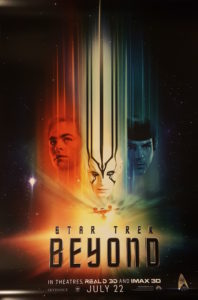 Hi Friends! It’s been a long and hot summer here in the sunflower state, but I managed to make it out on a date with my husband where we went to see Star Trek Beyond. If you didn’t know, I’ve been a total Trekkie since I was eleven, watching Star Trek TNG on a tiny black and white TV I managed to smuggle into my room for the express purposes of watching Star Trek every night at 9. I’ve been obsessed ever since.
Hi Friends! It’s been a long and hot summer here in the sunflower state, but I managed to make it out on a date with my husband where we went to see Star Trek Beyond. If you didn’t know, I’ve been a total Trekkie since I was eleven, watching Star Trek TNG on a tiny black and white TV I managed to smuggle into my room for the express purposes of watching Star Trek every night at 9. I’ve been obsessed ever since.But why didn’t I want to see the newest movie?
To be honest, I wasn’t thrilled with the movie trailer for Beyond. The previews made it feel too much like an all-action-no-story sort of movie. I’ve been burned countless times by movies that have been buried under a deluge of special effects, effectively wiping out any story that might have existed (sorry, Star Wars Ep. 3) so I wasn’t thrilled to see my beloved Star Trek fall prey to the same disease. However, the stars aligned, my husband and I found a babysitter, so I put my prejudices over the movie trailer aside and gave Beyond a chance.
I was pleasantly surprised. This newest installment had all the characteristics of a classic Star Trek movie, including my favorite–the Shakespeare quotes. Another classic trait of Star Trek movies are the in-depth character studies. I realize these are sci-fi films, and that they’ve got the reputation of being all about space battles, special effects, and big budgets, but I’ve come to realize that the writers of these movies focus on something different. Gene Roddenberry once said that if you took Captain Kirk, Spock, and Dr. McCoy and put their dialogue on a blank page with no tags or any indications of who was speaking, you would still be able to pick out who said what. How? Because they each have unique and distinct personalities. That thought has stayed with me as I work on my own writing.
Beyond is no different. While the actors did an excellent job, I want to also praise the writers. Here we have a classic Star Trek movie that follows the tried and true pattern of personal, internal and external conflicts. We first saw this pattern in Star Trek Episode 2, The Wrath of Khan, where Kirk is torn between personal problems of growing older, conflicts with an estranged son, and tasked with stopping Khan who wants a universal Armageddon. The same pattern follows in Beyond, where conflicts with Kirk finding his place in a vast universe, his relationship with his friends, and stopping another evil madman obsessed with destroying the universe. It’s a method that works. In fact, one of the writing classes I took studied this method in-depth as a “how-to” create dynamic characters. If you ever get the chance to listen to one of the William Bernhardt lectures, do it. He tells the story of Capt. Kirk’s character change in The Wrath of Khan that will leave you floored.
And those are my two cents on Beyond. Leave me a comment and let me know if you’ve seen it/plan to see it/what your thoughts are.
Live long and dream on!
-Tamara